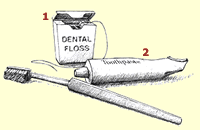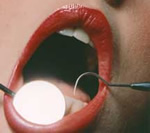Care
& Tips
Preventive
Care
Preventive care includes not only daily hygiene and
regular dental cleanings but also knowing and correcting
any causes of oral disease.
Daily Hygiene
 Flossing
& brushing are the most important components of
daily hygiene. Brushing should be done after every meal,
whether it be at the office, house, school, etc. Flossing
should be done at least once a day, preferably at night.
Always floss first, then brush. Take as much time for
each as needed in order to do a thorough job. Flossing
& brushing are the most important components of
daily hygiene. Brushing should be done after every meal,
whether it be at the office, house, school, etc. Flossing
should be done at least once a day, preferably at night.
Always floss first, then brush. Take as much time for
each as needed in order to do a thorough job.
Toothbrush
The correct shape for a toothbrush is the classic one,
which means it has short and flat bristles. Do not go
for the ones with a diamond, oval, or any other odd
shape. Keep it simple: short and flat. The bristles
should be hard or medium. If your gums are very sensitive,
you may use a brush with soft bristles.
Toothpaste
 The
ones with fluoride and sodium bicarbonate are the best
for your natural and artificial teeth. We recommend
Dental Care by Arm & Hammer. The
ones with fluoride and sodium bicarbonate are the best
for your natural and artificial teeth. We recommend
Dental Care by Arm & Hammer.
Dental Floss
There are different types of dental floss: waxed, unwaxed,
round, flat, and with or without flavor. Our advice
is to use waxed, flat (ribbon like), and unflavored
in order to avoid added chemicals, which only provide
color and flavor to the dental floss.
Regular Dental
Cleanings
 Once
an oral treatment has been completed, it is important
to visit our office every six months. During these regular
visits, we can perform a check up that includes ultrasonic
cleaning, visual inspection of every tooth, crown or
filling as well as check current soft tissues conditions.
X-rays should be taken on an annual basis. Once
an oral treatment has been completed, it is important
to visit our office every six months. During these regular
visits, we can perform a check up that includes ultrasonic
cleaning, visual inspection of every tooth, crown or
filling as well as check current soft tissues conditions.
X-rays should be taken on an annual basis.
Identification
& Correction
We try to take every factor into account that may cause
oral problems in the future. We discover and point out
to you any conditions that may cause future problems,
and offer you methods to prevent these problems. An
example of this is a missing tooth that has not been
replaced. This could cause your remaining teeth to shift
into abnormal positions,  causing
decay, periodontal disease, and TMJ dysfunction. Another
example is a tooth with a non-symptomatic fracture in
it. This may eventually cause the tooth to split in
half, causing pain, and requiring root canal treatment
or an extraction. There are many other dental findings
that could be treated in a preventive manner. We will
tell you about these findings, so you can decide if
you want to have the preventive treatment done. causing
decay, periodontal disease, and TMJ dysfunction. Another
example is a tooth with a non-symptomatic fracture in
it. This may eventually cause the tooth to split in
half, causing pain, and requiring root canal treatment
or an extraction. There are many other dental findings
that could be treated in a preventive manner. We will
tell you about these findings, so you can decide if
you want to have the preventive treatment done.
Disease Control
We promise to guide you in your efforts to maintain
a healthy mouth throughout your life. While is it possible
for dental professionals to correct most problems of
the teeth and gums, it is not possible for us to prevent
gum disease and tooth decay from causing problems in
the future. You are the only one who can keep your mouth
healthy. This will require diligent daily care on your
part, and regularly scheduled maintenance appointments.
|